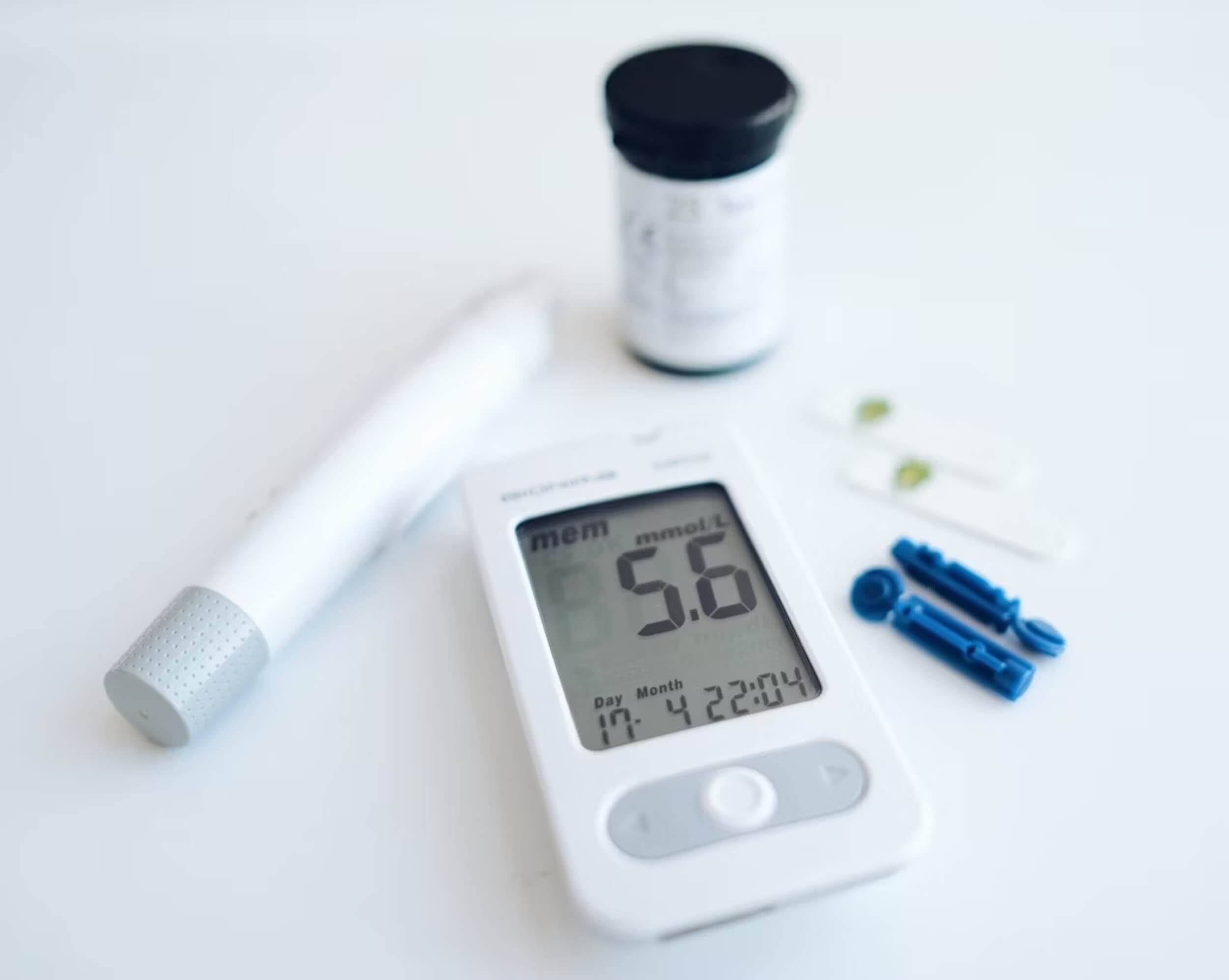When your blood sugar stays steady, your whole body runs smoother. It fuels your brain so you can think clearly, keeps your heart strong, and gives you the steady energy you need to move through the day. But when levels rise and fall too much, that balance starts to slip — and the effects can build up quietly over time.
Small shifts in blood sugar don’t just affect how you feel after a meal; they connect to bigger things like your heart health, memory, and how well your body ages. That’s the real link between blood sugar and long-term health — it touches nearly every system in the body.
Staying in balance isn’t about being perfect or strict. It’s about making simple, daily choices that keep your body in rhythm. Those steady habits now can mean a stronger, clearer, and healthier life for years ahead.
Understanding Blood Sugar and Its Role in the Body
Blood sugar is the fuel your body depends on. Every cell — from your brain to your muscles — needs glucose to work properly. But when sugar levels stay high for too long, it slowly strains organs and blood vessels, even if you don’t feel it right away.
How the Body Regulates Blood Sugar
Your body uses a hormone called insulin to help move sugar from your blood into your cells, where it’s turned into energy. When this system weakens — often from too much sugar and too little movement — glucose starts to build up in the bloodstream.
Why Balance Matters
Keeping your blood sugar in its “golden zone” is key. Too high or too low can cause problems. Early signs of imbalance may include:
- Feeling tired even after eating
- Sudden hunger or shakiness
- Frequent thirst or bathroom trips
- Trouble focusing
Paying attention to these small signals helps you act early and keep your energy steady. Maintaining this balance strengthens the link between blood sugar and lasting health.
When Blood Sugar Stays High: The Chain Reaction Inside the Body
Long-term high blood sugar doesn’t cause instant pain, but it sets off changes that slowly affect your whole system.
Impact on Circulation and Cells
When glucose builds up, it sticks to blood vessel walls, making them stiff and narrow. This limits oxygen flow and raises the risk for heart and kidney problems. Over time, it also triggers inflammation — a key factor behind many chronic diseases.
Oxidative Stress and Aging
Too much sugar leads to oxidative stress, which wears down healthy cells and speeds up aging. It weakens the body’s ability to repair itself, leaving skin, eyes, and tissues more vulnerable.
The good news? These effects aren’t permanent. Studies show that with steady control — healthy meals, exercise, and regular checks — the damage can be slowed or even reversed. Taking care of your blood sugar isn’t just prevention; it’s protection. The link between blood sugar and aging well is stronger than most realize.
How Blood Sugar Affects Major Body Systems
High or unsteady glucose levels can quietly touch nearly every part of your body. Here’s how it impacts key systems — and what you can do about it.
1. Heart and Blood Vessels
When blood sugar spikes often, it thickens and stiffens blood vessel walls, forcing the heart to work harder. Over time, this increases the risk of high blood pressure, heart attack, and stroke. Keeping glucose steady improves circulation and reduces strain on the heart.
Helpful habits:
- Choose fiber-rich foods like oats and beans
- Get moving for at least 30 minutes daily
- Manage stress with breathing or stretching breaks
A healthy heart shows just how deep the link between blood sugar and long-term strength runs.
2. Kidneys
Your kidneys act like filters, clearing waste from your blood. When glucose stays high, these filters get overworked, and small blood vessels start to wear down. That’s why steady levels matter.
Support your kidneys by:
- Drinking enough water
- Watching salt and processed foods
- Keeping your glucose within your target range
Early care helps prevent kidney strain and keeps this vital system running strong for years.
3. Eyes
The eyes are especially sensitive to changes in blood sugar. High levels can damage the tiny vessels behind the retina, leading to blurry vision or, over time, diabetic eye disease.
Protect your vision with:
- Annual eye exams
- Balanced meals that include leafy greens and omega-3 fats
- Controlled glucose and blood pressure
Caring for your sight is one more reason why the link between blood sugar and overall health deserves attention.
4. Nerves
Prolonged high sugar levels can damage nerves, especially in the feet and hands. Tingling, numbness, or burning sensations may follow. The earlier you stabilize your glucose, the better your nerves recover.
Keep nerves healthy with:
- Regular activity to boost blood flow
- B12-rich foods like eggs and fish
- Limiting alcohol and stopping smoking
Balanced sugar levels don’t just protect — they restore.
5. Skin and Oral Health
Your skin and gums are often the first to show signs of imbalance. Dryness, slow-healing wounds, or frequent gum infections can signal unsteady glucose levels.
For stronger protection:
- Moisturize regularly
- Brush and floss daily
- Stay hydrated and keep sugar within range
Your outer health reflects what’s happening inside — another reminder of the body-wide link between blood sugar and well-being.
Building Long-Term Health Through Blood Sugar Awareness
Creating balance doesn’t mean changing everything overnight. It’s the steady habits that make the biggest difference.
Healthy Eating for Balance
Food choices have the strongest impact on blood sugar.
Simple habits that help:
- Fill half your plate with veggies, a quarter with lean protein, and a quarter with whole grains.
- Pair carbs with protein or fat to slow sugar absorption.
- Swap refined carbs for high-fiber ones like beans, oats, and lentils.
- Eat at regular times to avoid big sugar swings.
Small daily changes can strengthen the link between blood sugar and better health — one meal at a time.
Physical Activity and Glucose Control
Movement makes your muscles soak up glucose, lowering blood sugar naturally.
Good options:
- 10-minute walks after meals
- Home workouts or light resistance training
- Active hobbies like gardening or dancing
Even short bursts of movement can keep levels steady throughout the day.
Stress, Sleep, and Hormonal Health
Stress hormones can raise blood sugar, so daily relaxation helps. Sleep also plays a major role — poor rest affects how insulin works.
Try:
- Deep breathing or short breaks during stressful moments
- 7–8 hours of quality sleep each night
- Gentle routines that calm your mind before bed
Balanced rest and stress care keep the body’s rhythm strong and steady.
Preventive Checks That Keep You Ahead
Catching small problems early can save you bigger trouble later.
Routine Screenings
- Blood tests for HbA1c, cholesterol, and kidney function at least once a year
- Eye and dental exams to check for early damage
- Foot checks for cuts, dryness, or numbness
Know Your Numbers
- HbA1c: Aim for under 7% (or as advised by your doctor)
- Blood pressure: Stay below 130/80
- Waist size: Keep within a healthy range for better insulin response
Partner with Health Professionals
- A dietitian or diabetes educator can help personalize your plan
- Regular follow-ups keep your progress on track
Simple checkups can strengthen the link between blood sugar control and lasting wellness.
Habits That Support Long-Term Balance
Consistency matters more than perfection.
Quit Smoking and Limit Alcohol
Smoking damages blood vessels and limits oxygen flow. Alcohol can raise or lower glucose unpredictably. Cutting back or quitting both helps your body stay balanced.
Stay Hydrated
Water helps the kidneys filter out excess sugar and supports every cell. Aim for 6–8 glasses a day.
Consistency Over Perfection
Small wins add up:
- Plan balanced meals
- Move daily
- Rest well
- Manage stress
Each steady week builds a stronger foundation for health. The more stable your habits, the stronger your link between blood sugar and overall vitality becomes.
Mental and Emotional Health Connection
Stress, sadness, or burnout can raise blood sugar without you noticing. Emotional balance is just as important as physical health.
What helps:
- Talk to someone — a friend, counselor, or support group
- Try relaxation habits like breathing exercises or journaling
- Spend time outdoors or listen to music that calms you
Stable emotions make it easier to eat well, stay active, and sleep better — all things that protect your blood sugar balance.
The Positive Side: Reversibility and Control
High blood sugar’s effects aren’t set in stone. With steady habits, many people see real improvements in energy, focus, and test results. Your body wants to heal — it just needs the right support. Food, movement, and regular checkups are tools that help it reset.
Staying aware of the link between blood sugar and health gives you control over your future, not fear of it.
Final Thoughts on Protecting Your Future Health
Balanced blood sugar is one of the simplest ways to protect your long-term health. It keeps your heart beating stronger, your mind sharper, and your body younger from the inside out.
No one needs to be perfect — just consistent. Simple choices like walking after dinner, eating real food, and getting enough rest can shape your future in powerful ways. The link between blood sugar and lifelong wellness is clear: the steadier your balance, the stronger your health for years to come.















